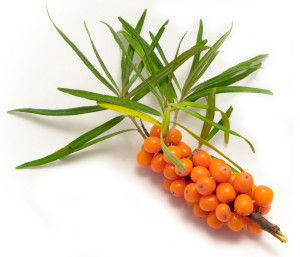Contents
Uses
- Arthritis
- Gout
- High cholesterol
- Vision disorders
- Ageing
- Cough
- Asthma
- Chest pain (angina)
- Cancer
- Heartburn
- Sunburn
- Wounds
- Pressure ulcers
- Cuts
- Acne
- Dry skin
Benefits
- In natural medicine, there are many benefits from Hippophae Rhamnoides. Leaves and flowers are utilized for arthritis, GI ulcers, gout and skin rashes and irritations. Tea made from the leaves contains vitamins and minerals, antioxidants, amino acids, and fatty acids. The tea is typically used for lowering blood pressure and serum cholesterol, prevention and treatment of diseases of the blood vessel, and for increasing immunity. Hippophae Rhamnoides berries are used for preventing skin infections, improving sight, and slowing the aging process. The tea is commonly applied to sunburns to reduce swelling and irritation while promoting healing.
- Seed or berry oil is used for asthma, angina, hyperlipidemia (high cholesterol), as an antioxidant and as an expectorant. Hippophae Rhamnoides oil is used in traditional medicine to slow the reduction of mental agility associated with aging and to reduce the side effects of cancer and cancer treatments. It may be used to treat human gastrointestinal tract (GI tract) diseases including ulcers, GERD, upset stomach, dyspepsia and constipation.
- Hippophae Rhamnoides is a supplemental source of vitamins C, A, and E, beta-carotene, minerals, amino acids, and fatty acids. One recent study suggests that Hippophae Rhamnoides seed oil may be effective for assisting in weight loss. Chinese researchers have completed a study suggesting that Hippophae Rhamnoides oil extract can lower cholesterol, reduce angina and improve heart function in patients with cardiac disease. Research on Hippophae Rhamnoides as it relates to weight loss, cardiac disease and cholesterol levels are ongoing and appear to be promising based on initial results.
- Hippophae Rhamnoides tea, oil or berries can be used for a variety of skin conditions and to heal wounds of the skin, and scientific studies indicate it may have some antibiotic properties. Extracts can be used for acne, rosacea, insect bites and sunburn.
Cautions
- Please consult your doctor.
Interactions
Moderate Interaction Be cautious with this combination
- Medications that slow blood clotting (Anticoagulant / Antiplatelet drugs) interacts with Hippophae Rhamnoides
Hippophae Rhamnoides might slow blood clotting. Taking Hippophae Rhamnoides along with medications that also slow clotting might increase the chances of bruising and bleeding.
Some medications that slow blood clotting include aspirin, clopidogrel (Plavix), diclofenac (Voltaren, Cataflam, others), ibuprofen (Advil, Motrin, others), naproxen (Anaprox, Naprosyn, others), dalteparin (Fragmin), enoxaparin (Lovenox), heparin, warfarin (Coumadin), and others.
Other Names
Ananas de Sibérie, Argasse, Argousier, Argousier Faux-Nerprun, Bourdaine Marine, Buckthorn, Chharma, Dhar-Bu, Épine Luisante, Épine Marrante, Espino Armarillo, Espino Falso, Faux Nerprun, Finbar, Grisset, Meerdorn, Oblepikha, Olivier de Sibérie, Purging Thorn, Rokitnik, Sallow Thorn, Sanddorn, Saule Épineux, Sea Buckhorn, Sceitbezien, Sea-Buckthorn, Seedorn, Star-Bu, Tindved
References
Herb Wisdom, http://www.herbwisdom.com/herb-sea-buckthorn.html

